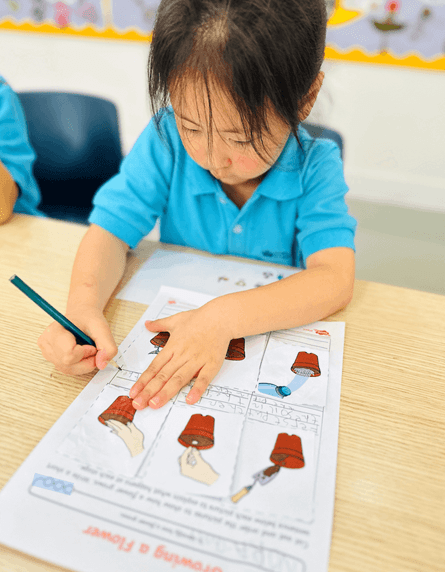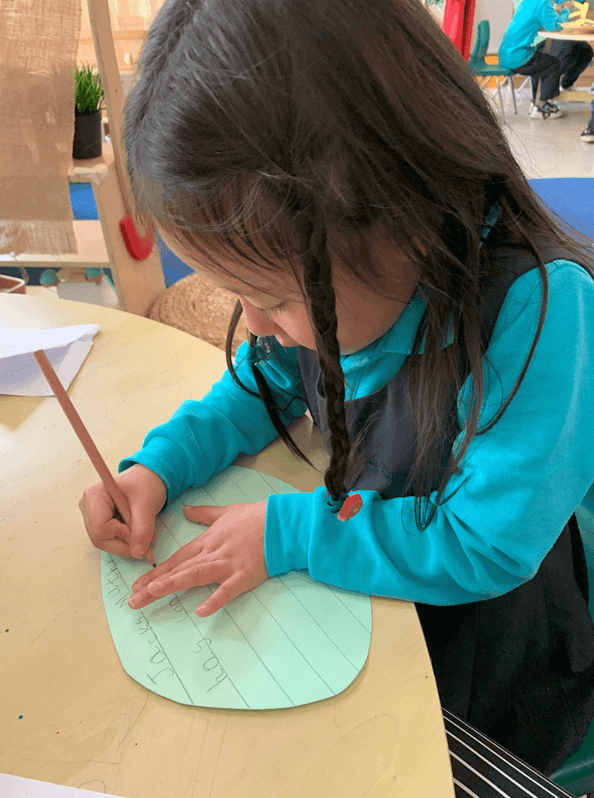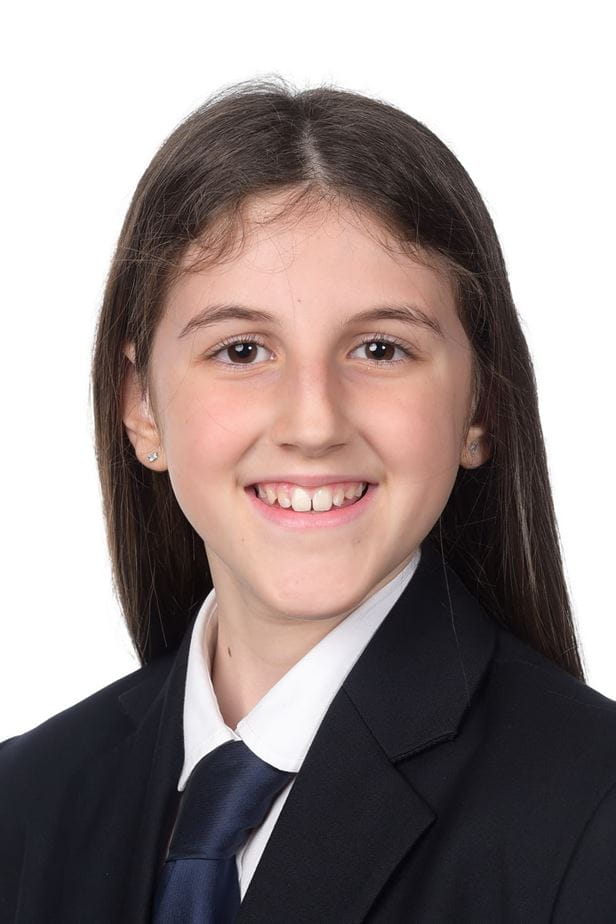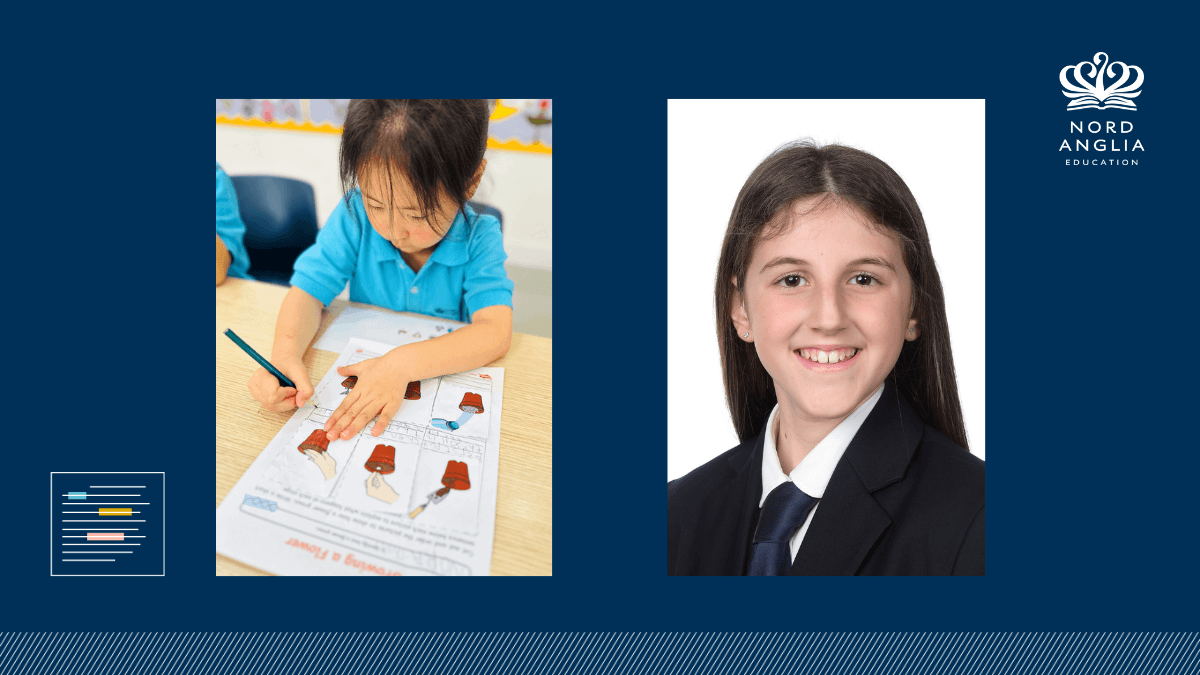Within the British education system, high standards in reading and writing are often referred to as ‘the keys to the curriculum’. Prerequisites to success across subject areas, these core areas also serve as prerequisites for our school’s shared vision:
Together, we develop creative, confident and considerate learners, prepared for their futures.
Last year, NAIS Pudong witnessed remarkable standards in students’ progress across Early Years and Primary. Nowhere was this more significant than in reading and writing. This transformation reflected not only the enthusiasm and determination of our students to excel academically, but also the dedication and expertise of our teaching professionals.
Through nuanced approaches that go far beyond conventional academic measurements, it is within our language-rich Early Years setting that the seeds for students’ success are sown. Aligning with the UK’s Development Matters framework, our Early Years specialists are experts at facilitating robust observation and assessment processes through creative and purposeful play opportunities.
Following the ‘Letters and Sounds’ framework, regular assessments in phonics enable our Early Years team to tailor phonic instruction and interventions, with students benefitting from small, fluid groups. Set against a shared pedagogy rooted in child-led learning, Early Years students at NAIS Pudong, typically demonstrate accelerated progress in their English language acquisition, and in reading and writing, frequently resulting in student attainment levels exceeding UK age group expectations.

Having joined our school in Reception 2022 with limited verbal English, Nora went on to exemplify accelerated progress against all Early Learning Goal expectations by the close of the academic year. Drawing on rich vocabulary choices in daily discussions with teachers and peers, Nora excelled in the early stages of her reading and writing journey, writing in complete sentences to share her ideas through independent work.

At the heart of NAIS Pudong’s shared success stories in English progress, also lies our ‘Talk for Writing’ model. Devised by Pie Corbett, a prolific writer in education and former advisor for The UK’s Department for Education, this programme typically spans across three-week cycles.
Week 1 commences with excitement: a ‘hook’, to pique students’ curiosity and wonder. From fancy-dress, to mysterious over-sized eggs appearing within the grounds of the school, to perplexing crime scenes staged late in the evening by ever-enthusiastic teaching staff, one never quite knows what to expect at the start of a new English unit!
With imaginations captured, students subsequently begin the process of internalising shared texts, drawing on a variety of visual images (story maps) and exciting drama opportunities. Our over-riding aim: to instill not simply a love of literature, but also confidence, through a love of spoken English. It is arguably this component of the Talk for Writing model – talk – that Pie Corbett champions most ardently through his ongoing contributions within the field of education.

Within NAIS Pudong’s student community, nowhere are the positive impacts of our shared teaching strategies in English better encapsulated than in current Year 7 student, Aurora. Joining us at the start of Year 6 in 2022 with limited spoken English, Aurora has gone on to flourish both academically and socially, leading to her receiving the Principal’s award for exemplifying our school value, ‘confidence’.
With plot structures and language patterns internalised, weeks 2 and 3 of the Talk for Writing process see each of our students further emerging as articulate oral story-tellers. Following individual plot substitutions, it is here that students’ unique literary worlds begin to take form through animated classroom discussions, story planning activities and, ultimately, independent writing opportunities. The underlying strategy behind our Talk for Writing model: a systematic lightening of students’ cognitive load.
When we ask a child to sit and write, the expectations are both complex and demanding. Consider: letter formation, phonics application, spelling, grammar, punctuation, fictional characters & place settings, plots – and then consider that for many students within an international setting, this process is completed within their second, third or fourth spoken language! Through the Talk for Writing model, we strive to furnish every child with the tools essential to navigating this complex process skillfully. With key plot structures and language patterns internalised, our students quite simply have greater capacity to focus on the all-important essentials of writing. Equally, students also have far greater capacity to enjoy the process, taking pride in their work as creative story-writers.
Committed to developing creative, confident and considerate learners prepared for their futures, it is with a deep sense of pride that we celebrate not only the below examples of accelerated progress in writing, but also the many examples across our school, from every single class.
Well done to each and every one of our students on all the progress that they continue to make, and thank you to each of them for the many engaging stories shared – long may each of us continue to nurture our shared love of language and literature!










.jpg?rev=-1&hash=4B1ADA74AB0E829CB2ECEE6BEF89D006)